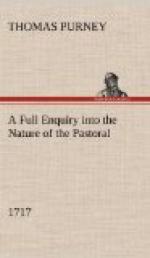As I have hinted that Theocritus had a Genius capable of writing a perfect Set of Pastorals, his Similies are infinitely the best of any Swain’s. The chief Rule, I think, to be observ’d is (if Rules can be given for such Things as these) that SIMILIES be contain’d in three or four Words. As this of PHILIPS’s.
Whilon did I, all as this Pop’lar
fair,
Up-raise my heedless Head devoid of Care,
&c.
Or at most they ahould not exceed a Line. As this is a very Beautiful one In the same Author. And also in his 1st Pastoral.
A Girland, deck’t with all the
Pride of May,
Sweet as her Breath, and as her Beauty
gay, &c.
I shall not give my Opinion of the following Similies; yet I might say that I think ’em not altogether so fine as the foregoing two. Altho’ they contain delightful Images
As Milk-white Swans on Silver Streams do show, And Silver Streams to grace the Meadows flow; As Corn the Vales and Trees the Hills adorn, So thou to thine an Ornament was’t born.
Past. 3.
The next relates to the Sweetness of Colinet’s Voice.
Not half so sweet are Midnight Winds, that move In drowsy Murmurs o’re the waving Grove; Nor dropping Waters, that in Grotts distil, And with a tinkling Sound their Caverns fill.
Past. 4.
Methinks thus dressing a Thought so pompous in SIMILIES, raises so our Expectation, that we are fit to smile when the last Line comes.
There are also another kind of Similies, which being heapt in the same manner, seem to be design’d by VIRGIL, and those who have taken their Thoughts from him, rather to fill up Space with somthing Pastoral, than to be the natural Talk of Shepherds. For Swains are not suppos’d to retard their Storys by many or long SIMILIES; their Talk comes from the Heart, Unornamental; but Similies, in Pastoral, are for Ornament. But I must show what kind of Thoughts I mean, which I also account SIMILIES, but they have a peculiar Turn given to ’em. I remember but two in Mr. PHILIPS Pastorals.
First then shall lightsome Birds forget to fly, The briny Ocean turn to pastures dry, And every rapid River cease to flow, ’Ere I unmindful of Menalcas grow.
The other is this.
While Mallow Kids; and Endive Lambs pursue; While Bees love Thyme; and Locusts sip the Dew; While Birds delight in Woods their Notes to strain, Thy Name and sweet Memorial shall remain.
But now I have given Examples of those Similies which seem faulty; and quoted at the beginning of the Section, some that are good; I will bring an Instance of a SIMILIE, which is more delightful to the Fancy than all these put together; and which show’s that Theocritus thought ’twas a small thing to put down Pastoral Thoughts or Images, if he did not cull the most pleasurable in Nature. CREECH has translated it very well. DAPHNIS had conquer’d MENALCAS in Singing.




